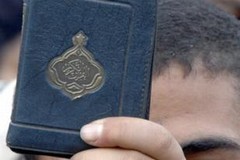Share
Human Rights Voices
While the UN devotes its human rights operations to the demonization of the democratic state of Israel above all others and condemns the United States more often than the vast majority of non-democracies around the world, the voices of real victims around the world must be heard.
Egypt, December 17, 2006
Court denies Bahai couple document IDS
Original source
"Egypt's highest administrative court ruled yesterday that a Bahai couple cannot identify themselves as members of the Bahai faith in their official documents, a decision human rights advocates called a setback for religious freedom in Egypt. The ruling leaves Egypt's 2,000-member Bahai minority in a legal no-man's land, unable to get identification cards, register births or receive government services without writing that they belong to one of three religions recognized by the Interior Ministry: Islam, Christianity and Judaism. The decision overturned a lower court ruling in favor of the Bahai and cannot be appealed. However, Egyptian Bahais say they plan to bring other cases to court to win the right to state their religion on official forms. "The government is now in a corner, where they will have to solve this problem. They cannot violate someone's basic rights because they don't like their beliefs," said Hosam Bahgat, whose human rights organization, the Egyptian Initiative for Personal Rights, legally represented the couple....
The case decided yesterday has become not just a barometer of Egypt's willingness to guarantee freedom of religion to its citizens, but also a sign of the growing competition between the state and Islamist forces to prove their religious Muslim credentials, human rights advocates said. In parliamentary speeches this autumn, lawmakers from the ruling National Democratic Party vied with Muslim Brotherhood representatives over who could be more vociferous in their opposition to the Bahai faith, which was described as a threat to Islam. A series of fatwas from Egypt's highest religious authority, Al Azhar, has condemned the Bahai faith, which has its origins in Shi'ite Islam, as a form of Islamic apostasy and a threat to public order. Shouts of "God is Great" rang through the courtroom yesterday as the head of an eight-judge panel announced the verdict. Open Bahai practice in Egypt was banned in 1960. Although the constitution officially guarantees freedom of worship, Bahai marriages are not recognized, and there have been periodic waves of arrests. The U.S. government has condemned the government's treatment of the religious minority. Despite the ban, Bahai generally have been permitted to practice their professions and pray in their homes. Until 2000, many Egyptian Bahai were able to obtain national ID cards that identified them as Bahai or did not indicate any religion. But this policy changed in 2000 when the government instituted a computerized ID system and said all Egyptians must identify themselves as one of the three "heavenly religions" mentioned in the Koran.
The Cairo couple who lost in the ruling yesterday, Hosam Izzat Musa and Ranya Enayat Rushdy, had ID cards that said they were Bahai. Their three daughters, all under age 12, had Bahai written on their birth certificates. When Mrs. Rushdy applied to put her daughters on her passport in 2004, however, all of the family's documents were confiscated. Authorities told them they must now identify themselves as Muslims. Egyptian Bahais are not asking for official recognition of their faith, just the right to hold documents on which they don't have to lie. Leaving the religion line blank or writing "other" also would be acceptable solutions, Mr. Bahgat said."

